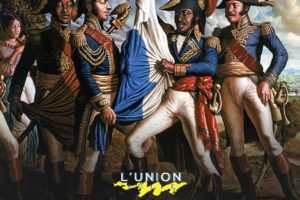
Meet Michel-Rolph Trouillot (1949-2012) (PhD, Johns Hopkins 1985) was a Haitian academic and anthropologist. He was Professor of Anthropology and of Social Sciences at the University of Chicago.In 2011, Trouillot was awarded the Frantz Fanon Lifetime Achievement Award, which is given annually by the Caribbean Philosophical Association in recognition of work of special interest to Caribbean thought. In 1977, his first book Ti dife boule sou Istwa Ayiti on the origins of the Haitian slave revolution was published. It has been described as “the first book-length monograph written in Haitian creole.” In July 2012, Université Caraïbe Press reprinted this masterful work. Trouillot’s lifetime of work presented a vision for anthropology and the social sciences, informed by historical depth and empirical examination of Caribbean societies.The Haitian historian and novelist Henock Trouillot was his uncle. Trouillot died on July 5th, 2012. – Source
According to The Haitian Times which is this online source:
On March 1, the Center for Latin American and Caribbean Studies at New York University will host a one-day symposium to honor the life and celebrate the significant body of work of Dr. Michel-Rolph Trouillot. His remarkable legacy starts with the imprint he left on telling Haiti’s more comprehensive history — Trouillot’s first book was the first non-fiction work about the Haitian Revolution written in Kreyòl. Trouillot’s lasting impact extends further, into academia, and the way in which anthropologists, sociologists and historians study and tell the story of people of African descent. Trouillot’s seminal work Silencing the Past: Power and the Production of History, (published in 1995) offered a way to write world history that challenged the prevailing prejudice that considered a country born out of a successful slave revolt as unthinkable.
Trouillot was born in Port-au-Prince, on November 26, 1949. His family was, and still is today, renowned for producing some of Haiti’s leading thinkers, writers and artists. He attended Petit Séminaire Collège Saint-Martial (known for its progressive leadership of Pères du Saint-Esprit), and L’École Normale Supérieure.By the 1960′s, New York City became home to the largest population of Haitian ex-pats. Trouillot joined this massive migration, in an effort to flee the repressive Duvalier dictatorship. While he drove taxis to earn a living and support his family, Trouillot earned a bachelor’s degree at Brooklyn College in 1978 — one year before he completed his first book, Ti Difé Boulé Sou Istoua Ayiti, A Small Fire Burns Onto Haiti’s History.
Trouillot went on to complete a PhD in anthropology at Johns Hopkins University — where he would serve as founding director of the Institute for Global Studies in Culture, History, and Power. His dissertation on Dominica’s rural farmers became his second book Peasants and Capital: Dominica in the World Economy, and the first academic study on the island’s peasantry. It placed Trouillot on the global stage, as a thinker who exposed how low-wage banana producers were inter-connected with a globalized economy.
In his follow up books, Les Racines Historiques de l’état Duvaliéren and Haiti, State against Nation: The Origins and Legacy of Duvalierism, Trouillot explored the Haitian government and its role within the society, in the wake of the Duvalier regime. From analyzing Haiti, he turned a skeptical eye to anthropology and history. It began with a 1991 essay, Anthropology and the Savage Slot: The Poetics and Politics of Otherness, published in Recapturing Anthropology. Though Antenor Firmin, a Haitian scholar and statesmen, had been one of the pioneers of anthropology in the late half of the 19th century, a majority of anthropologists were now of European descent (or practiced the dominant theories stemmed from the European tradition). Trouillot demonstrated the practice of ‘The Other’ as a method many academics use to reference peoples of color and their cultures. This world view was a result of the power structure to which most of these scholars belonged to.
Four years later, Trouillot continued his argument with Silencing the Past: Power and the Production of History. He explained the complex ways in which power dictates how history is told, and in doing so, silences a majority of actors who played critical roles in changing history.
With some fifty publications, in three languages, Trouillot has lengthened the scope of our understanding of power — as he became a forceful voice in telling the story of people who resist its capacity to oppress.





























